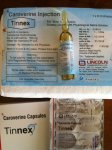Thanks joe for your consideration below are the test to be performed to know that the person has cochlear synaptic tinnitus.
Interpretations of Various Test required for Diagnosis Of cochlear Synaptic Tinnitus
1. High Frequency Audiometry(0KHz to 16KHz)
In a patient with S.n. hearing loss in both segment i.e. 0-8000 and 8000-16000 Hz is indicative of Cochlear symnaptic tinnitus.
In a patient with Normal hearing in conventional audiogram i.e. 0Hz to 8000 Hz. If it shows S.n. hearing loss in high frequencies i.e. 8000-16000 Hz ,once again it is in favour of CST
If there is absolutely normal hearing, it may/may not be CST and it depends on other reports .
2. Impedance Audiometry and Eustachian tube function tests.
Any middle ear pathology may be a causal factor for generation of CST. So before you treat your patient of CST with Caroverine, Middle ear functions should be normal. Impedance audiometry and Eustachian tube function test are important test to rule out any possibilities of middle ear functional abnormality.
Normal functioning middle ear should have T.m with proper elasticity with cone of light antero inferior,Middle ear pressure should be as equal as atmosphearic air pressure and Eustachian tube should be capable of compensating middle ear pressure with both +ve as well as –Ve atmosphearic Pressure changes. Compliance of T.M and Ossicular chain should be within normal range, External canal volume, Middle ear Volume and Gradiants data shuld be within normal range.
3. Acoustic reflex testings and Clinching reflex test.
It helpd in differentiating Middle ear pathology (ossicular fixation) ,and Retrocochlear pathology by way of performing ipsi and contra reflexes.
Clinching Reflex Test:
In continuations of acoustic reflex ,while testing for 500 and 1000 Hz, once normal reflex are recorded, repeat the recording with clinching of teeths.In case of myoclonus tinnitus there will be significant deepening of the reflexes will be found .In this situations it is in favour of middle ear tinnitus ,unless proved otherwise.
4. Reflex Decay Test
It is known to everyone that if decay is found +Ve in this test it is evident of retro cochlear pathology. This patients do not respond with Caroverine.
Remember that there may be combine pathology.i.e. Cochlear and retrocochlear.
5. Tinnitus matching :-
In a free field or with headphone testing one may ask patient to match his tinnitus with the presented sound. Signals of various frequencies may be presented to patient and patient confirms the most matching frequency.
Low frequency (250/500) unless proved otherwise are patients of middle ear tinnitus (Myoclonus tinnitus).
High frequency tinnitus (1000-16000Hz) is in favors of cochlear synaptic tinnitus.
6. Tinnitus grading:
In a free field or with headphone testing one may ask patient to match his tinnitus with the intensity of presented sound. Signals of various intensities may be presented to patient and patient confirms the most matching intensity. This is how one may findout the intensity of the tinnitus in dB.
Both tinnitus matching and grading, in addition to diagnostic value, has also got prognostic value. During treatment (I.e. During Caroverine infusion), patients response to Caroverine can be easily monitored by asking him about any change or reduction in frequency and intensity.
7. SISI test
+Ve SISI test (Short Increment Sensitivity Index) is an evidence of recruiting ear. This is the sign of cochlear Pathology. +ve test is in favour of cochlear Pathology.Please remember that Only +ve sisi test is diagnostic for CST but it is not the indication for use of Caroverine. For that middle ear functions should be normal ,Tinnitus should be of high frequency and there should not be any persistant causal factor's existence in the body,responsible for the generation of the tinnitus.
8. If required one may take help of ENG,E.Coch G , BERA,ASSR.Otoacoustic Emission, and some of the blood tests.

 Member
Member Anyway
Anyway
 Founder
Founder